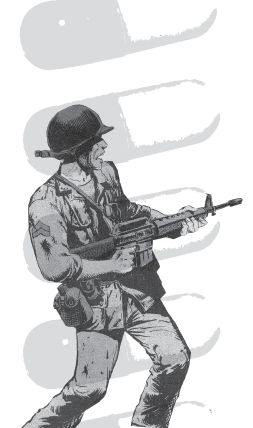
A grim milestone was observed in June when the 2500th American serviceperson was killed in the most recent Iraq war. Even more startlingly, when assessing the damage to U.S. military personnel and their families, that figure may be misleadingly low. No precise means exists to tally broken lives, damaged relationships, and the general psychological trauma of soldiers asked to do what is otherwise unthinkable in our society — kill. But a survey of the headlines suggests that there is more afoot in Iraq than loss of life.
On June 18, the U.S. Army charged three of its own soldiers with the murder of detainees near the Thar Thar Canal. Several weeks earlier, reports surfaced alleging that U.S. marines massacred 24 Iraqi civilians in Haditha, a turbulent settlement in the “Sunni Triangle” of Iraq, last November. The latter killings, which were described as “methodical,” included the killing of a two year-old girl and an incapacitated man in a wheelchair. Reports indicate the massacre occurred over a period of as long as five hours, apparently motivated by the death of 20-year-old Lance Corporal Miguel Terazzas from an improvised explosive device. Apart from that explosion, it appears the Marines were not otherwise provoked. The killings could signify the darkest moment for the U.S. in three years of war, worse even than the infamous Abu Ghraib prisoner abuse scandals.
Most would contend that these and similar atrocities are perpetrated by deranged individuals who were unstable before arriving in Iraq or, at worst, predisposed to psychiatric breakdown. But that explanation fails to speak to the twenty-two suicides committed by troops on active duty in Iraq last year or the disclosure by the U.S. department of Veteran Affairs that one-third of troops returning from combat are mentally unwell and one-fifth still serving in Iraq are suffering from post-traumatic stress disorder.
So, do episodes like Haditha and Abu Ghraib signify an anomaly, or is it possible that this war — and perhaps modern warfare in general — leaves an indelible mark on the psyches of its combatants and, occasionally, causes otherwise mentally healthy people to do atrocious things?
Lt. Col. Dave Grossman (ret.) has founded a research group tasked with addressing those very questions. The group is based on “Killology,” a field Grossman pioneered in his Pulitzer-nominated On Killing. He describes Killology as “the scholarly study of the destructive act.” The research group places particular focus on healthy individuals placed in situations where they are forced to kill.
Grossman asserts that the human brain contains an instinctive resistance to killing its own kind, an instinct shared with other mammals (where it is essential in preventing a species from destroying itself during territorial and mating rituals). In the proverbial heat of battle, that instinct can even override logical directives issued from the prefrontal cortex, the analytical center of the brain.
The United States military seemingly recognizes that inherent resistance and, since 1946, has employed programs to overcome it. One of the most basic examples is the use of realistic human-shaped targets that fall when hit — a practice B.F. Skinner once called “a nearly perfect example of operant conditioning” (before World War II bull’s eye targets were used).
The challenge for military authorities is to draw and enforce fine lines between different types of killing once the threshold has been narrowed and soldiers shoved past their natural inhibition to kill. The three army men charged with murder embody the paradox at the heart of this issue. Certainly, the complications of modern warfare make the line between sanctioned and unsanctioned killing sometimes difficult to see.
While it is likely that wartime killing has always been psychologically damaging, Grossman points out several differences between ancient and modern warfare that are particularly detrimental. The first is the dramatic lengthening of the average engagement. Many of the great historical battles like Waterloo and Gettysburg lasted only hours or days, often with no fighting at night. But beginning with World War I, engagements could be protracted over weeks and even months, twenty-four hours per day, without a chance to rest or recuperate. Further, hunter-gatherer tribes and ancient civilizations typically staged “purification rituals” for their returning warriors, an act vital in facilitating their reintegration into society. The modern equivalent (parades and unquestioned acceptance) are becoming less and less common, and with long tours of duty the opportunity is often not present. Even simple debriefings cannot always take place during periods of intense combat. Following the Vietnam War soldiers notoriously experienced the opposite extreme of purification and reacceptance, and instead met with harassment, criticism, and isolation. It’s clear that public disapproval of the Iraq War is taking its toll on the psyche of returning veterans today.
The military is violating even its own regulations, sending to the front or keeping in combat troops with severe psychological problems.
These things considered, one would think a careful approach is demanded with regard to the psychological health of service members. Unfortunately, that has not been the case in recent conflicts. Investigative journalists from the Independent in London have called the U.S. army forces in Iraq “disenchanted and exhausted.” There are widespread reports of chemical dependency among troops and the over-prescription of antidepressants by military doctors. Counseling and therapy is said to be rare, even for troops returning to Iraq for second and third tours. U.S. authorities do face a challenge, as the evacuation of mentally ill soldiers could be seen as a “free ticket home.” But the Associated Press has reported that the military is violating even its own regulations, sending to the front or keeping in combat troops with severe psychological problems. The Army’s top mental health expert, Col. Elspeth Ritchie, openly acknowledged that service members diagnosed with post-traumatic stress disorder have been sent back into combat, claiming it was necessitated by recruiting problems and troop shortages.
So let’s revisit the events that allegedly took place at Haditha, this time with consideration to environmental factors that could have been in place leading up to the killings:
On an intolerably hot day in the desert, human beings in United States Marine uniforms, who had been living in less than ideal conditions for many months, watched as their friend T.J. Terrazas’ body was split in half by a sudden explosion. This was not the first tour in Iraq for some, nor their first time witnessing the death of a friend. There was no enemy in sight. They’d seen insurgents kill and immediately blend into the population before, especially in chaotic environments like Haditha. Most of the soldiers were less than twenty-one years old. They were angry, their enemy was faceless, and their natural resistance to murder had been forcibly removed long ago.
No one would wish to exculpate or in any way excuse what reports say four of the soldiers did next, but can we honestly, in good conscience, place the blame squarely on their shoulders? Accountability must be taken for putting them in that situation and for arming them with the ability to make decisions most humans naturally cannot.
Three decades after the Vietnam War made post-traumatic stress disorder synonymous with the horrific aspects of military experience, the comprehensive effect war has on the human psyche is still not fully understood. Several things are clear, however. First, body counts and figures denoting monetary expenditures are insufficient in gauging a war’s cost. Second, modern militaries must search for ways to properly treat the psychological effects of pushing soldiers past their natural reluctance to kill their own kind. Finally, blame for wrongful action in combat cannot continue to be exclusively placed on individual soldiers — many of whom are too young to buy alcohol, trained to kill, and subjected to conditions the common citizen could only experience in nightmares.





No Comments so far ↓
There are no comments yet...Kick things off by filling out the form below.